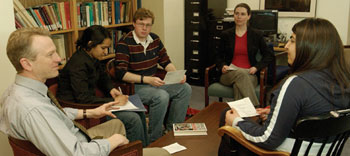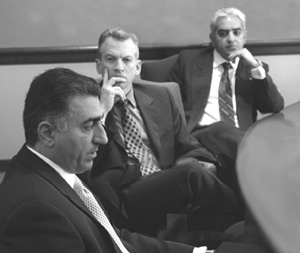 |
|
||
|
|||
Core Current Affairs Association
Bursting academic bubbles: topics from AIDS to Iraq to the Old Towne Team
By Tim Stoddard
|
|
James Johnson, a CAS assistant dean and director of the Core Curriculum (from left), discusses the Core Current Affairs Association’s upcoming lectures with Nashila Somani (CAS’07), Andrew David (CAS’06), Liberty Davis, Core Curriculum program administrator, and Mayse Yaraghi (CAS’07). Photo by Kalman Zabarsky |
|
In the throes of final exams her freshman year, Holly Naylor had an unsettling epiphany. Studying in the GSU, she glanced up at a television news program and realized, she says, “that I knew nothing about what was going on in the rest of the world. I knew more about the politics and social issues of ancient Greece than I did about my own country. I was stuck in such an academic bubble.”
Naylor (CAS’05) decided to pop the bubble. In 2003, she founded the Core Current Affairs Association (CCAA), a student organization that sponsors forums and lectures addressing timely issues in politics, world affairs, sports, and a wide range of other topics. The group of CAS Core Curriculum students meets regularly to select issues for upcoming lectures and to coordinate events, which have attracted diverse audiences. Some of the events fill the Tsai Performance Center, while others are more intimate affairs targeted at more specialized audiences.
The Core Curriculum is an integrated series of eight courses in the humanities and natural sciences that builds a foundation for a liberal education. CAS freshmen and sophomores in the program study classical and contemporary works, delving into the Great Books from antiquity up to the 19th century. “The Core does a really good job of introducing world history basically from the Big Bang up until the present,” says Naylor. “I thought it would be a suitable and appropriate to start an organization that dealt with current events as well.”
Past forums have addressed the buildup to war in Iraq, the AIDS crisis in Africa, and the future of democracy in the Middle East. On a lighter note, the CCAA this month is turning to baseball and has invited Joe Castiglione and Jerry Trupiano, the longtime announcers on WEEI’s Red Sox Radio Network, to share their unique perspective on the Old Towne Team. Famous for their colorful play-by-play, their energetic outbursts (“Way back! Way back!”), and their insightful commentary, the duo will talk about the enduring need for radio coverage of the national pastime when they discuss Why Radio Matters on Wednesday, April 13, at 2 p.m. in the School of Law Auditorium. “They can talk about whatever they want, but we’ve suggested that they share their thoughts on how listening to games on the radio can be more memorable and vivid than actually seeing them,” says James Johnson, a CAS assistant dean, director of the Core Curriculum, and a CCAA faculty advisor. “It’s really a chance for them to talk about the magic of this humble medium.”
Later this month, the CCAA will host a lecture on quite a different topic: The Private and Secret Lives of JFK, featuring newly declassified home movies and taped telephone conversations from the John F. Kennedy Presidential Library. Allan Goodrich, chief archivist at the library, and Maura Porter, head of declassification, will present the material in light of President Kennedy’s policy decisions. The speakers will also address the evolving perceptions of presidents over time, says Andrew David (CAS’05), who has served as CCAA chairperson since Naylor graduated in January. “This topic is especially relevant given the current White House administration and George W. Bush’s interesting take on history and his legacy.”
The CCAA is already planning an impressive lineup of speakers for the fall, among them documentary filmmaker Errol Morris and former Massachusetts Governor Michael Dukakis.
Connecting to the news
|
|
James Johnson (center) and Sassan Tabatabai, an instructor in the CAS Core Curriculum, listen to Reza Pahlavi (left), the eldest son of the former shah of Iran, discuss the Future of Democracy in Iran at a forum last April. Photo by T. J. Kirkpatrick |
|
At a time when many young adults are uninterested in the news, CCAA’s lecture series aims to engage students by bringing human faces to sometimes abstract issues. In April 2004, the group invited Reza Pahlavi, the eldest son of Iran’s former shah, to discuss the future of democracy in Iran. For David, who was taking a class at the time on 20th-century Turko-Persian history, hearing Pahlavi speak added a personal dimension to his understanding of the Middle East. “It’s one thing to read about the Iranian revolution in a textbook,” he says. “But here was the son of the man who was running the country talking not only about the revolution, but about living in exile — the Iranian government put a bounty on his family’s heads. It was pretty moving.”
At another well-attended CCAA event, in April 2003, Kenneth Kaunda, the first president of the Republic of Zambia, discussed the AIDS crisis in Africa and the plight of children orphaned by the disease. Kaunda, who was the University’s first Balfour African President-in-Residence at the African Presidential Archives and Research Center, has worked hard to prevent the spread of HIV/AIDS in Africa. That first-person perspective, Johnson says, adds meaning and depth to an issue. “Students can take the temper of the speaker’s character and start to think about where they fit in, what path they are on,” he says. “They may be stimulated and inspired, not just in terms of intellectual growth, but also in personal growth. I think that fundamentally changes how students look at figures in the news or think about these issues.”
Some students are already responding. At a small forum last month entitled Grassroots on Comm. Ave., which addressed the rise in political mobilization on college campuses, one of the guest speakers was Lauren Olofson (CAS’06), an alumna of the Core Curriculum. An intern at a Boston-based grassroots political action group, she traced her political awakening to her BU education. “She surprised me and made me proud by talking first about Alexis de Tocqueville,” Johnson says. “His insight into American democracy was that everyday Americans are able to make a difference, and that’s how she understood grassroots campaigning. That’s just the sort of connection that we want students to make between their lives and what they’re learning in the classroom.”
![]()
8
April 2005
Boston University
Office of University Relations

